12 Jun 14 | Cameroon, Iran, News and features, Nigeria, Russia
The 2014 World Cup in Brazil starts today, 32 nations preparing to battle it out across eight groups in the first stage of the tournament.
This year’s competition, like so many before it, comes with its designated group of death. For those not familiar with the lingo, it means the group containing the highest amount of strong teams. Or even more simply put, the group most difficult to progress from. (You can’t accuse the beautiful game of holding back on the melodrama).
Index has looked at the countries taking part in arguably the biggest show on earth, and put together our own group of death — the freedom of expression edition.
Cameroon
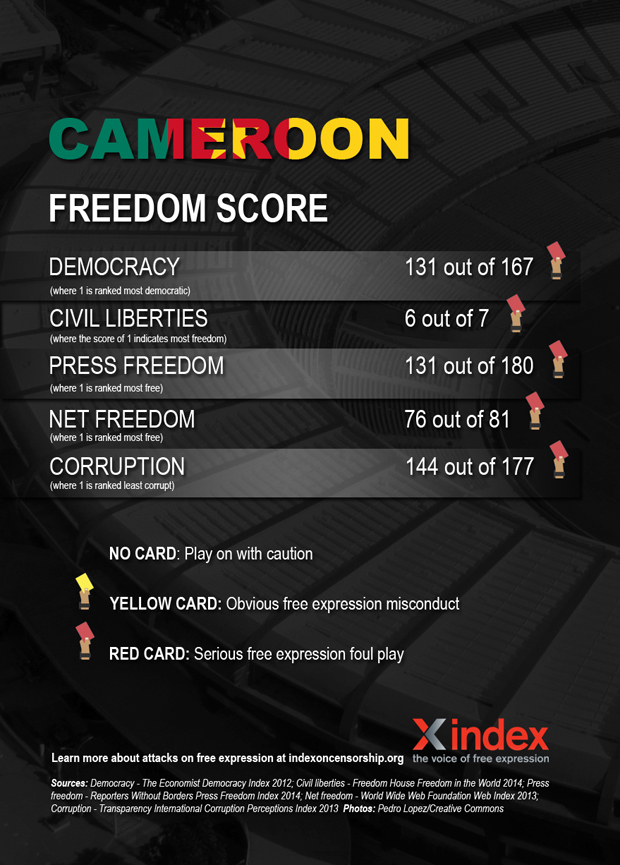
Cameroon — or the Indomitable Lions — have a solid track record in qualifying for the World Cup, having taken part seven time, more than any other African side. There were also the first African team to make it to the quarter final and are responsible for one of the most iconic moments in the tournament’s history. Their track record on free speech, however, is less impressive.
Freedom of expression is guaranteed in Cameroon’s constitution. Despite this, the government of Paul Biya — the country’s leader since 1982 — has been been accused numerous violations of free expression.
Large parts of the press are biased towards the ruling elite, while critical journalists face detainment, harassment and demands to reveal sources, among other things. Self censorship is widespread. In September 2013, 11 press outlets, including newspapers, radio stations and a TV station, were shut down for disrespecting “ethics and professional norms”. In 2010, former newspaper editor Germain Ngota, who had been investigating corruption allegations involving the state-run oil company, died in jail.
Freedom of assembly is often cracked down on. In 2012, former opposition presidential candidate Vincent-Sosthène Fouda and others were charged with “holding an unlawful demonstration”. The same year, security forces used tear against a crowd gathered to protest against Biya. In 2008, around 100 people were killed in clashes with police in anti-government riots.
Arts are not spared either. In 2013, Jean-Pierre Bekolo’s film Le President was banned in Cameroon because it discussed the end of Biya’s reign . In 2008, Lapiro de Mbanga, who criticised the constitutional change in term times that would allow Biya to stay in powers through song, was arrested.
Homosexuality is outlawed, and punishable by up to 14 years in prison. Human rights violations against LGBTI people, or those perceived to be, are “commonplace”. In July 2013, Eric Ohena Lembembe, director of the Cameroonian Foundation for AIDS (CAMFAIDS) was brutally murdered, in what friends suspect was an attack based on his pro-LGBTI advocacy.
Iran
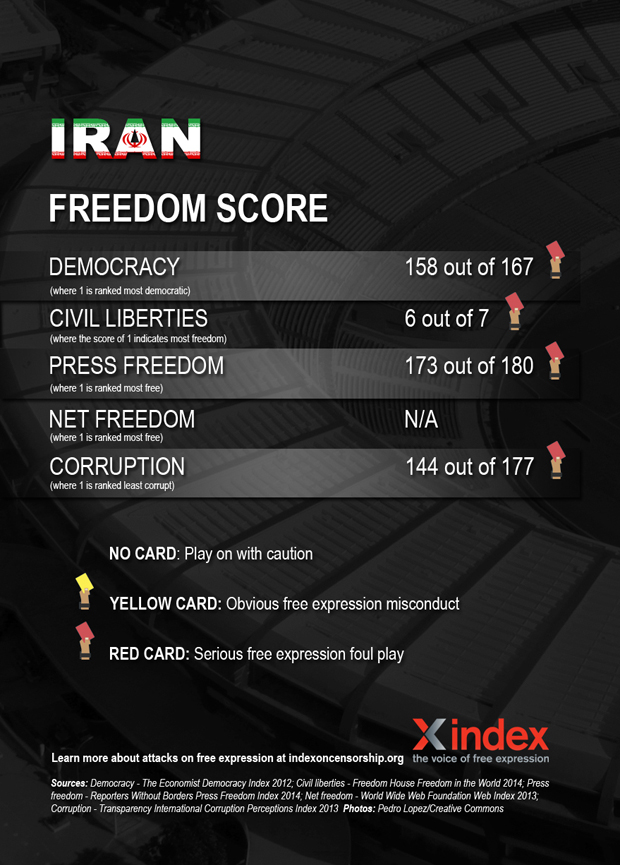
Team Melli will hope that their fourth appearance at the World Cup will see them progress from the group stages for the first time. When he was elected almost a year ago, there was hope that President Hassan Rouhani would be a progressive force within Iran. The results so far have been mixed.
Since coming into power, Rouhani has taken some steps to improve press freedom, such as withdrawing 50 motions against journalists, and lifting some restrictions on previously banned topics. However, the government still controls all TV and radio, and censorship and self-censorship is widespread. The latest figures put the number of jailed journalists in Iran at 35. In January 2013, a group of journalists were arrested for allegedly cooperating with “anti revolutionary” news outlets abroad. Journalists’ associations and civil society organisations that support freedom of expression have also been targeted.
The internet and social media played a significant part in publicising and documenting the protests that followed the 2009 election, which many Iranians believed was fraudulent. The regime has banned Facebook, YouTube, Twitter and, recently, Instagram. The lead-up to the 2013 elections saw Iranian leaders tightening access to the web, and silencing “negative” news. While Rouhani — seemingly an avid Twitter user — has indicated plans to relax web censorship, the country’s plans to launch a “national internet” are said to be going ahead.
In May, eight people were jailed on charges including blasphemy, propaganda against the ruling system, spreading lies insulting the country’s supreme leader Ayatollah Ali Khamenei on Facebook. Recently, a group of young people were arrested over a video posted of them singing and dancing along to the song “Happy”, which police called was a “vulgar clip” that had “hurt public chastity”. Some commentators believe the move was meant to intimidate Iranians and discourage online criticism.
Nigeria
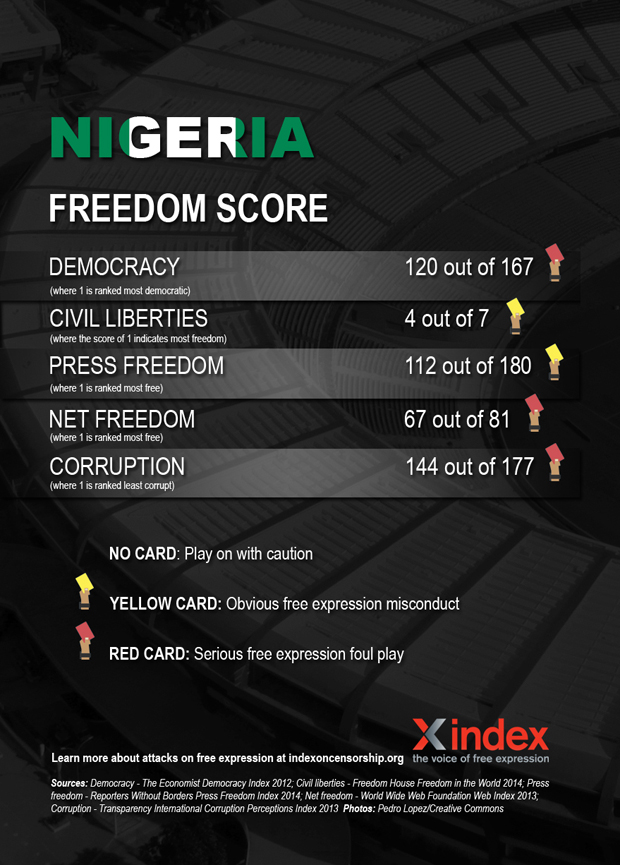
Brazil 2014 marks 20 years since Nigeria’s first outing at the World Cup, and the Super Eagles arrive at the tournament as reigning Africa Cup of Nations champions. The country’s leadership, however, is not a champion of free expression.
While parts of Nigerian media is controlled by people directly involved in politics, the country can also boast a lively independent media sector. However, journalists, especially those covering sensitive topics such as corruption or separatist and communal violence still face threats. Journalists have been arrested by security forces, and media outlets have been attacked by terrorists. Legal provisions such as sedition and criminal defamation also challenge press freedom. In 2011, a journalist was arrested over stories detailing alleged corruption in the Nigerian Football Federation.
The country’s freedom of information act was put in place in 2011. However, when human rights lawyer Rommy Mom tried to use the legislation to trace some 500 million of missing aid money allocated to his flood ravaged home state of Benue, he was met with threats from people connected to the state governor, and was forced to flee.
The Same Sex Marriage Prohibition Act 2013 outlawing gay marriage and relationships, was signed into law by President Goodluck Jonathan in January. The unpublished law makes it illegal for gay people to hold meetings, and outlaws the registration of homosexual clubs, organisations and associations. Those found to be participating in such acts face up to 14 years in jail.
Nigeria has come under international attention in recent months for abduction of the Chibok school girls by terrorist group Boko Haram. Among other things, Nigerians responded with the powerful #BringBackOurGirls campaign. In June however, authorities seemed to ban an offline protest against the kidnappings, before quickly backtracking. It is also worth noting that the Nigerian government has targeted journalists in their “war on terror”.
Russia
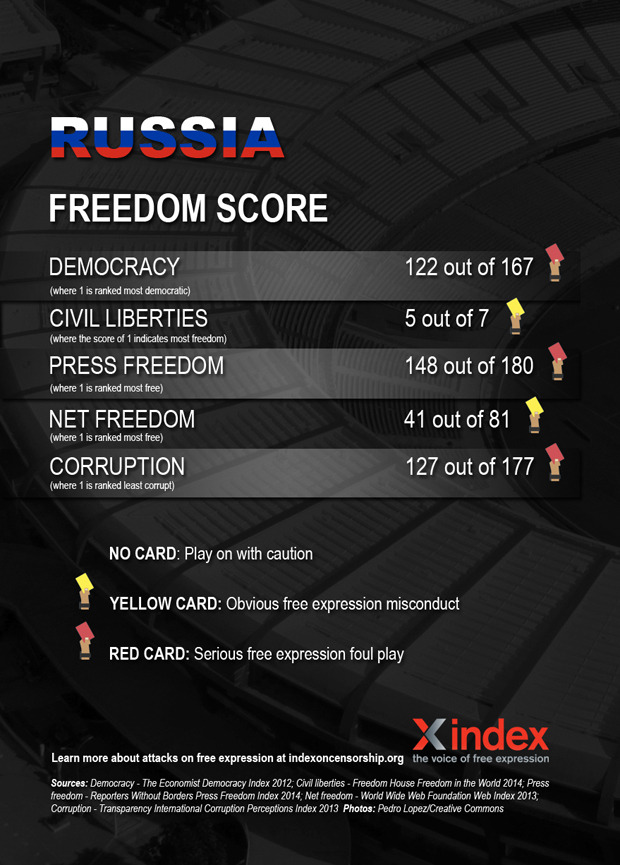
Team Sbornaya travel to Brazil in the knowledge that next time in the World Cup rolls around, they will be playing on home soil. Russia of course, recently hosted another international sporting event — the 2014 Winter Olympics. However, global attention did not improve the country’s poor record on freedom of expression. In fact, experts predicted a rise in censorship ahead of the Olympics.
Press freedom has long been under attack by Russian authorities, with TV news currently providing little beyond the official government line. In the last few months, the relatively well-respected TV channel RIA Novosti was liquidated following a decree by President Vladimir Putin, and replaced by a new press agency headed by a Kremlin-loyalist. In January, Dozhd, a popular independent TV channel was dropped by satellite and cable operators over a controversial survey. For the remaining critical journalists, Russia — one of the countries with the highest number of unpunished journalist murders — is a dangerous place to work.
The crackdown on the internet is widely believed to have started with the protests surrounding the elections securing Putin’s third term in power, organised partly through social media, but it has recently intensified. The Duma has adopted controversial amendments to an information law, targeting bloggers with blocking and fines for anything from failing to verify information posted, to using curse words. Also recently, the founder of “Russian Facebook” VKontakte says he was forced out, with the son of the head of Russia’s largest state-run media corporation predicted to take over as CEO. In 2013, the Duma approved legislation allowing immediate blocking of websites featuring content deemed “extremist”.
Public protests are discouraged through forceful responses by police, arrests, harsh fines and prison sentences. The country’s recent anti-gay legislation also pose a big threat to free expression and assembly. The ban on “promotion” of gay relationships, means that any form of expression deemed to be “gay propaganda” can be shut down. The law has also lead to physical attacks on Russia’s LGBT population.
An earlier version of this article stated that Brazil 2014 marks ten years since Nigeria’s first outing at the World Cup. This has been corrected.
This article was published on June 12, 2014 at indexoncensorship.org
12 Jun 14 | Azerbaijan, Azerbaijan News, Bahrain, Brazil, China, Draw the Line, Russia
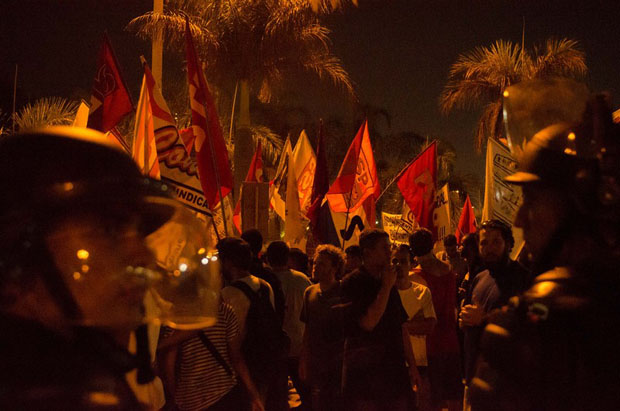
Protests against increase in public transportation costs in Rio de Janeiro on 13 February (Image: Mauricio Fidalgo/Demotix)
The World Cup — arguably the biggest international event on the planet — is upon us once more. But in the past year, Brazilians have been using their rights to free expression to organise large-scale protests to show their dissatisfaction with hosting the tournament. Meanwhile, revelations of serious human rights violations and corruption related to 2022 host Qatar have emerged. This year, human rights are sharing the spotlight with the beautiful game and its stars.
This isn’t the first time politics and sports have mixed. Just think of the Formula 1 Grand Prix races hosted in Gulf kingdom Bahrain, where authorities have cracked down on pro-democracy protesters; or the 2008 Olympics organised by the Chinese communist regime, which employs two million people to help monitor web activity; or the 1978 World Cup held in then-military dictatorship Argentina. More recently, Vladimir Putin’s Russia hosted the Winter Olympics (and will host the 2018 World Cup) not long after implementing homophobic legislation targeting so-called “gay propaganda”, while Belarus, which has been ruled by dictator Alexander Lukashenko since 1994, organised the 2014 Ice Hockey World Championship. Azerbaijan, with its, according to the latest figures, 142 political prisoners, is playing host to the inaugural European Games in 2015.
That’s without even considering the many human rights abuses perpetrated by authorities in participating countries.
The question that often comes up when these huge, prestigious events roll around, is how do we respond to the countries that repress their citizen’s free expression? Should we boycott? Should we use the attention to raise our voice on human rights abuses? Should we engage or ignore? Get involved the discussion using the hashtag #IndexDrawtheLine and tell us — where do you draw the line?
This article was published on June 12, 2014 at indexoncensorship.org
11 Jun 14 | Africa, News and features, South Africa
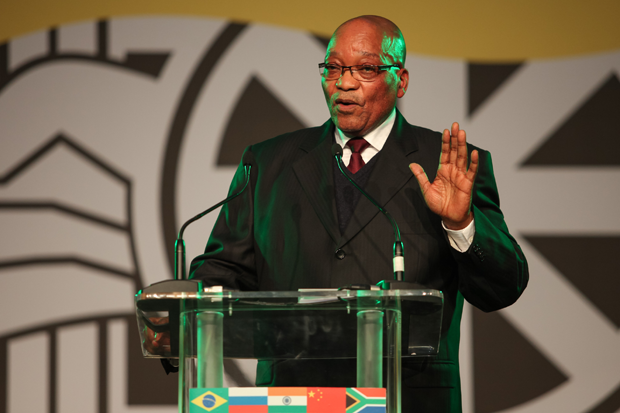
President Jacob Zuma of South Africa (Photo: Jordi Matas/Demotix)
Rumours in the run-up to South Africa’s fifth democratic election that a “ministry of propaganda” was planned, have come to fruition as the formation of a new “ministry of communication” has been announced. The reasons for this development could be found in the results of the 8 May national and provincial elections, which returned the African National Congress (ANC) to power but, as predicted by the party’s own research, with a reduced majority – from 65.9% to 62.1%.
The party experienced its primary electoral setbacks in metropolitan areas, particularly Johannesburg and the capital Tshwane (Pretoria), both situated in the province called Gauteng, which means “place of gold” in the local Sesotho language – aptly so, as Gauteng is the economic heartland of the country.
ANC provincial votes in Johannesburg came to 52% while provincial votes for the ANC in Tshwane dipped to 49%, both cases a decline of 10% from the previous election in 2009. It was left to the more peripheral cities to pull the ANC through in Gauteng. Another large city, Nelson Mandela Bay in the Eastern Cape, came in below 50% again, just as it had done in 2009. Notably, the ANC received its usual high percentages of votes in the predominantly rural provinces of Mpumalanga, Limpopo, Free State and KwaZulu Natal, which clocked between 64% and 78% in turnout for the ANC.
This discrepancy in ANC support between metropolitan and rural areas could be explained with regards to access to media. The residents of Tshwane and “the Afropolitan city” of Johannesburg (as some scholars call it) have several options when it comes to accessing information and news opinion. Apart from the public broadcaster’s TV and radio stations, there is a range of privately owned media to choose from: from newspapers and radio stations owned by competing media companies, to various online news sources, to social media in the form of blogs, Twitter and Facebook.
This would indicate the political need for the creation of a ministry particularly aimed at controlling the flow of information, especially as local government elections are due to take place in two years’ time, with the ANC running the risk of losing control of the most significant metropolitan areas in the economic centre of South Africa. The ANC’s poor performance in Gauteng can be attributed to various controversies concerning its leader Jacob Zuma, who has been the president of South Africa since 2009. These controversies range from the introduction of a road tolling system in Gauteng without proper public consultation to Zuma being implicated in massive misappropriation of state funds spent on his private homestead in the rural hinterland of KwaZulu Natal. Combine these events with Zuma’s status as self-proclaimed traditionalist who frowns upon women’s emancipation and gay rights, it would seem that the president was a liability that cost the ANC votes in Gauteng.
While these controversies are debated in Gauteng media, voters in the more rural provinces found themselves mostly beholden to officially sanctioned news from the South African Broadcasting Service (SABC). The SABC has been immersed in successive battles for political control which reflect the factional conflicts within the ruling ANC. Political interference in the SABC has become a feature of the Zuma presidency.
During the 2014 election campaigns, the SABC banned no less than three opposition party advertisements even though it is legally compelled to ensure fair exposure of all political parties in the run-up to elections. The reasons were spurious. For example, the SABC claimed that footage showing and criticising excessive police force amounts to inciting violence against the police. Appeals to the Independent Communications Authority of South Africa (Icasa), constitutionally mandated to oversee the SABC, failed. The affected political parties – the Democratic Alliance and the Economic Freedom Fighters – took to YouTube to ensure public exposure of the ads – with ads going viral.
The new ministry of communication seems a direct intervention to stem negative publicity. Polls show that Zuma has become a liability to his party. He is however just one factor influencing the growing impression that the ANC is failing in its task to overturn the legacy of apartheid. The party’s response has been to further tighten control over the flow of information – a trend that includes the adoption of the Protection of State Information Act, which seeks to clamp down on journalists and citizens generally accessing state information that reveals government corruption or incompetence.
In Zuma’s announcement of his new cabinet after the election, the erstwhile ministry of communications has been split into two: a ministry for telecommunications and postal services and a ministry for communications. The latter, he said, would be responsible for overarching communication policy and strategy, information dissemination and publicity as well as the branding of the country abroad. Improved communication and marketing will promote an informed citizenry and also assist the country to promote investments, economic growth and job creation.
This conflation of marketing and branding with information dissemination, all for an “informed citizenry”, is further strengthened by the “components” that the ministry would be “formed out of”:
- Icasa
- SABC
- Government Communications and Information System (GCIS)
- Brand SA and
- Media Development and Diversity Agency (MDDA)
As mentioned, the SABC’s constitutional mandate is to act as a public broadcaster, which includes being politically unpartisan. Similarly, Icasa is constitutionally mandated to act independently. The MDDA Act clearly states this body’s functions as impartially and independently promoting the diversification of the media. Lumping together marketers and government communicators with journalists and bodies responsible for promoting access to information suggests that the new ministry represents a more concerted attempt to obviate the country’s constitutional commitment to the “freedom to receive or impart information or ideas”.
This article was published on June 11, 2014 at indexoncensorship.org
10 Jun 14 | Americas, Brazil, Digital Freedom, Digital Freedom Reports, Index Reports, News and features
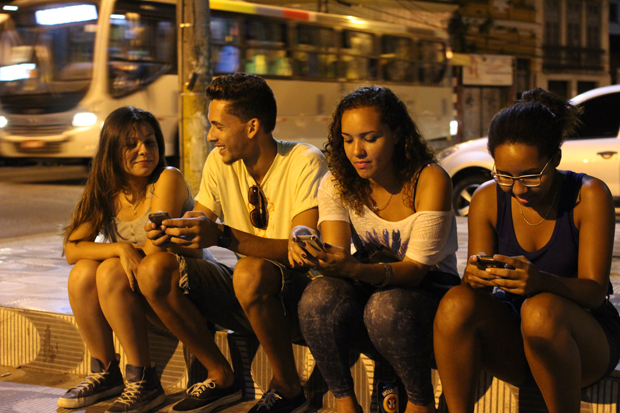
World Cup host country Brazil has the potential to become an influential, global leader in digital rights — but that will depend on key decisions taken in the coming months, Index on Censorship says in a report published today.
The internet has provided new opportunities for free expression in the country, but attempts to regulate content, inequality in access to the internet and violence against journalists, are among the challenges to internet freedom that remain in Brazil.
“With the adoption of a progressive legislation on internet rights, Brazil is taking the lead in digital freedom,” said Melody Patry, Index’s Senior Advocacy Officer and author of the report Brazil: A new global internet referee? “Digital technologies have provided new opportunities for freedom of expression in the country, but have also come with new attempts to regulate content and strong inequalities between those with and without access to the internet. Old problems like violence against journalists, media concentration and the influence of local political leaders over judges and other public agents persist,” she said. Brazil recently signed into law the Marco Civil bill, known as the internet bill of rights. It will provide a much-needed legal framework for internet rights, while also making Brazil the largest country in the world to enshrine net neutrality in its legal code. The law also includes stricter privacy standards to fight surveillance, and guarantees freedom of expression online. However, the country still faces considerable challenges in ensuring it can deliver on the promise of the new legislation.
The report is available in English and Portuguese. This article was published on June 9, 2014 at indexoncensorship.org
10 Jun 14 | Egypt, Middle East and North Africa, News and features
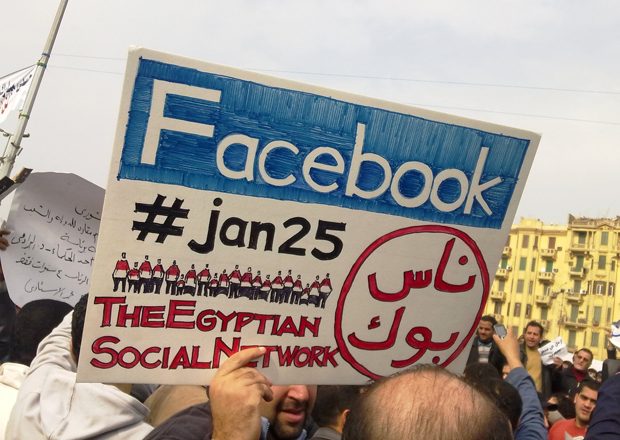
(Image: Essam Sharaf/Wikimedia Commons)
A few months after the adoption of a progressive new constitution guaranteeing freedom of expression and the right to privacy, reported plans by Egyptian authorities for indiscriminate mass surveillance of social media in Egypt have alarmed rights advocates and many within the country’s internet community.
The proposed surveillance plan has also sparked fears that internet activists may be the next targets of the military-backed government’s widening crackdown on dissent.
Defending his ministry’s decision to introduce the new mass monitoring system, Egypt’s Minister of Interior Mohamed Ibrahim was quoted by the semi-official Al Ahram newspaper on Monday as saying that the proposed system was “necessary to combat terrorism and protect national security”. He added it would be “similar to that used in the US or the UK to protect their national security”.
Seeking to allay concerns that the new system would curtail freedom of expression, Ibrahim said: “We do not seek to interfere with citizens’ privacy. The system will merely help us track and identify potential terrorist and criminal threats.”
Ibrahim’s statements came a day after the privately-owned Al Watan newspaper published a leaked call by the ministry of interior for tenders from companies to establish a sophisticated mass surveillance system.
In a statement criticising the proposed mass surveillance plan, Amnesty International said the monitoring of social media “would deal a devastating blow to the rights to privacy and freedom of expression in the country”, adding that “the new surveillance system risks becoming yet another instrument in the Egyptian government’s toolbox of state repression”. Amnesty also urged the Egyptian authorities not to replicate illegal programmes that have been used by other countries to violate the right to privacy. “Any surveillance programmes must comply with the general principles under international law of legality and judicial accountability,” the statement said.
Meanwhile, Egyptian rights groups and internet activists have expressed fears the proposed system would “close down the last remaining space for free expression in Egypt”.
Since the ouster of Islamist president Mohamed Morsi by military-backed protests last summer, the interim authorities have taken measures to tighten the state’s grip on the media. Days after the military takeover of the country, several Islamist-linked media outlets were shut down by the interim government. Security forces ransacked the offices of a Muslim Brotherhood TV channel and the Al Jazeera Mubasher Channel (accused by Egyptians of being pro-Muslim Brotherhood), confiscating their equipment and arresting their journalists.There has since been a marked shift in the tone of both state and state-influenced news media with many journalists now towing the government line either for fear of persecution or of being labelled “unpatriotic.” Several journalists have complained of “harassment” and intimidation” by security agencies. In today’s deeply polarised Egypt, reports of verbal and physical attacks by “patriotic” mobs on journalists trying to cover the conflict, are all too common.
Journalists covering “anti coup” protests have been deliberately targeted by security forces with no fewer than five being shot and killed while covering the unrest. Mayada Ashraf who worked for the privately-owned El Dostour newspaper became the latest journalist-victim of the violence when she was shot in the head in March while covering clashes between security forces and supporters of the ousted Morsi. Meanwhile, 65 journalists have been detained since the military takeover of the country nearly a year ago. There are 17 journalists currently behind bars in Egypt, according to a recent report released by the Committee for the Protection of Journalists. Three Al Jazeera English journalists have been in prison for six months, charged with “aiding a terror group and spreading false news that harms national security.” Despite pleading “not guilty”, their repeated requests to be released on bail have thus far been denied by the prosecutors in the case. A fourth Al Jazeera journalist has been in jail since August 2013 and has to date, not been charged.
Besides detecting any references to terrorism on social media, the controversial new system will also scan social networks for “calls for illegal protests and sit-ins, incitement to violence and defamation of religion,” Abdel Fattah Othman, a spokesman for the ministry of interior said in an interview broadcast Sunday on Al Mehwar Channel. In the absence of a “watch list” determining the topics the ministry intends to censor, many internet users are worried, fearing their electronic communications may be targeted.
Responses by Egyptian internet activists to the ministry’s surveillance plan have teetered between anger and sarcasm. Some Twitter users chose to take the matter lightly, mocking the decision in their tweets. #Wearebeingwatched — created by Twitter activists a week ago in response to the proposed plan — has fast become one of the top trending hashtags in Egypt with more than 50,000 uses within the span of a single week.
“State security agents when are you coming to get me?” Mahmoud El Zanaty a Twitter user jokingly asked, using the hashtag.”You never keep your appointments.”
“I’m free, that is why I’m being watched,” was another sarcastic message posted, by a user going by the twitter handle Doaa. Meanwhile, in a message addressed to the “agent” supposedly watching him, another twitter user wrote: “Farrag, come join me for tea!”
While most rights activists fear the proposed surveillance system may be used as a tool of repression, a few rights advocates have dismissed it as “mere government propaganda”.
“State security agencies have always kept a close watch on social media networks in Egypt,” Rights Lawyer Gamal Eid told Index. He cautioned however, that the ministry’s announcement was meant “to intimidate online activists and silence voices of dissent”.
Over the course of the past three years, several activists have been arrested and prosecuted for the content they have posted on social media networks. Blogger Maikel Nabil was arrested in March, 2011 and later sentenced to 3 years in prison for a Facebook post allegedly insulting the military. He had written: “The army and the people were never one hand.” He spent ten months behind bars before being released. In September 2012, Alber Saber, a Computer Science student and blogger was also arrested on allegations of having shared the YouTube trailer of the anti-Islam film “Innocence of Muslims” on his Facebook page. While police found no evidence that he had uploaded the video deemed insulting to Islam, he was nevertheless sentenced to 3 years in prison for “defaming Islam and Christianity” and allegedly “spreading atheism”. Saber was released for an appeal session a year later and subsequently fled the country. Earlier this year, Amr Hamzawy, a prominent liberal intellectual and political scientist was charged with “insulting the judiciary” for a Twitter post criticising a court ruling against three US pro-democracy civil society organisations .
Ahead of the January 2011 uprising, young pro-democracy activists had used social media networks to mobilise and organise the mass protests that brought down autocratic president Hosni Mubarak. Videos depicting police brutality and others urging Egyptians to rise against the corrupt Mubarak regime posted by the April 6 pro-democracy youth movement and “We Are All Khaled Said” — a Facebook page created by Google Executive Wael Ghoneim to bring attention to the brutal murder of a young Alexandrian (allegedly beaten to death by two police officers) — were the initial spark igniting the 2011 uprising, prompting some analysts to describe the revolt of 3 years ago, as a “Facebook Revolution”. Recognising the role of social media in the mass uprising, Mubarak cut off the internet and mobile phone lines in an attempt to quell the protests, a few days after their eruption. His rash response however, triggered public furore and only served to further strengthen the resolve of the Tahrir protesters.
With internet penetration in Egypt at 43 per cent (at the end of last year) — relatively low compared to other countries where illiteracy rates are lower than in Egypt — the Egyptian government is nevertheless wary of social media, having witnessed first-hand the role of Facebook and Twitter in toppling the authoritarian regimes in the region. Despite provisions in the recently-adopted constitution protecting the right to privacy and guaranteeing the confidentiality of electronic correspondence, telephone calls and other means of communication, the military-backed authorities are taking no chances. Systematic monitoring of Facebook, Twitter, You Tube and possibly mobile phone applications such as WhatsApp, Viber and Instagram would enable the government to identify dissenters and possibly, crackdown even harder on them, critics fear.
In the past year, the interim government has shown little respect for freedoms and rule of law. With military strongman Abdel Fattah El Sisi now sworn in as the country’s new president and in the wake of the proposed mass surveillance plan, skeptics warn that things are likely to get even worse as a counter-revolutionary bid seeking to obliterate all traces of the 2011 Revolution that called for bread, freedom and social justice, gains ground in Egypt.
This article was published on June 10, 2014 at indexoncensorship.org
09 Jun 14 | About Index, Campaigns, Press Releases, Statements

Ahead of the World Cup, Index on Censorship’s new policy paper Brazil: A new global internet referee? (PDF: [English] | [Portuguese]) explores the challenges and threats to online freedom of expression in the country.
In the wake of a global internet conference – Netmundial – and the signing of a groundbreaking domestic internet law – Marco Civil – Brazil has the potential to become an influential leader in digital rights. But that will depend on key choices and decisions taken in the coming weeks and months. Drawing on interviews with leading figures in Brazilian civil society, internet businesses, politicians and journalists conducted in Sao Paulo and Rio de Janeiro in February 2014, the paper analyses the country’s increasing profile in global internet governance debates and the consequences of its domestic internet policies.
“With the adoption of a progressive legislation on internet rights, Brazil is taking the lead in digital freedom” Index’s Senior Advocacy Officer and author of the paper, Melody Patry said.
“Digital technologies have provided new opportunities for freedom of expression in the country, but have also come with new attempts to regulate content and strong inequalities between those with and without access to the internet. Old problems like violence against journalists, media concentration and the influence of local political leaders over judges and other public agents persist.”
By the end of June 2013, more than 105 million people, 52% of the Brazilian population, had internet access at work, home, school or in cyber cafés. Brazilians are among the world’s top users of blogs and social networks. Considerable hopes are being placed on the new Marco Civil bill, which will provide a much-needed progressive legal framework for internet rights. The bill was signed into law on 23 April 2014, making Brazil the largest country in the world to enshrine net neutrality in its legal code. The law also includes stricter privacy standards to fight surveillance, and guarantees freedom of expression online. However, Brazil still faces considerable challenges in ensuring it can deliver on the promise of the new legislation.
“Brazil must now build on Marco Civil to ensure the respect of the right to freedom of expression online and offline, and promote internet rights in the international sphere”, Patry said.
In order for Brazil to provide a safe space for digital freedom and ensure the promise of Marco Civil is met in reality, Index on Censorship offers the following recommendations:
At the international level, Brazil should:
• Use its leadership to further promote a free and fair internet by continuing to publicly advocate for fundamental internet principles such as net neutrality, user privacy and freedom of expression in international forums
• Ensure that civil society organisations are deeply involved in the discussions and decision-making process on global internet governance, and that the outcome of international debates adequately reflect their recommendations
• Resist intervention by powerful lobby groups and governments to skew the outcome of multistakeholder gathering
• Refuse to adopt or sign up to repressive measures and/or international agreements favouring internet censorship, top-down approach of internet governance and tighter government control of the internet
At the domestic level, Brazil should:
• Reform defamation and privacy laws to ensure they are not used to prosecute journalists and citizens who express legitimate opinions in online debates, posts and discussions
• Provide proper training to the judiciary and law enforcement agencies on defamation and other freedom of expression-related issues
• Introduce clear guidelines regarding civil defamation lawsuits, especially in regard to the use of content takedown and the setting of indemnification amounts
• Ensure that all cases of killings and other forms of violence against media professionals and human rights defenders are effectively, promptly and independently investigated, and those responsible are held accountable
• Be more transparent about the ongoing work around privacy legislation, including the Data Protection Bill
• Pursue their efforts in promoting digital access and inclusion to all Brazilians by expanding the Digital Cities programme and stick to the target of ensuring 40 million households or 68% of the population are able to access broadband by the end of 2014 as part of the National Broadband Plan
Brazil: A new global internet referee?
PDF: [English] | [Portuguese]
For further information and interview requests, please call 0207 260 2660
06 Jun 14 | Azerbaijan News, Digital Freedom, News and features
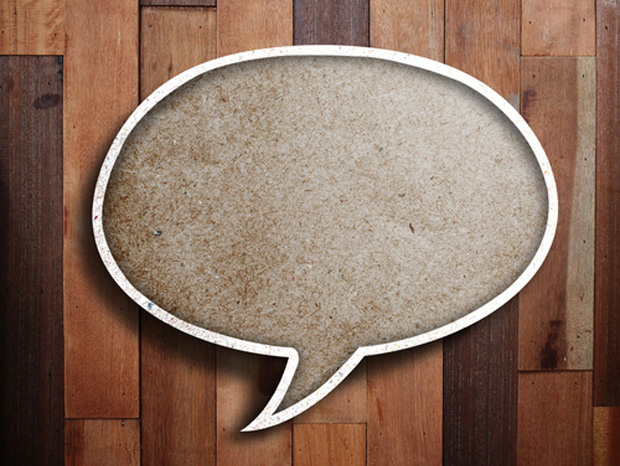
(Image: Bplanet/Shutterstock)
Croatia’s new criminal code has introduced “humiliation” as an offence — and it is already being put to use. Slavica Lukić, a journalist with newspaper Jutarnji list is likely to end up in court for writing that the Dean of the Faculty of Law in Osijek accepted a bribe. As Index reported earlier this week, via its censorship mapping tool mediafreedom.ushahidi.com: “For the court, it is of little importance that the information is correct – it is enough for the principal to state that he felt humbled by the publication of the news.”
These kinds of laws exist across the world, especially under the guise of protecting against insult. The problem, however, is that such laws often exist for the benefit of leaders and politicians. And even when they are more general, they can be very easily manipulated by those in positions of power to shut down and punish criticism. Below are some recent cases where just this has happened.
Tajikistan
On 4 June this year, security forces in Tajikistan detained a 30-year-old man on charges of “insulting” the country’s president. According to local press, he was arrested after posting “slanderous” images and texts on Facebook.
Iran
Eight people were jailed in Iran in May, on charges including blasphemy and insulting the country’s supreme leader Ayatollah Ali Khamenei on Facebook. They also were variously found guilty of propaganda against the ruling system and spreading lies.
India
Also in May this year, Goa man Devu Chodankar was investigated by police for posting criticism of new Indian Prime Minister Narendra Modi on Facebook. The incident was reported the police someone close to Modi’s Bharatiya Janata Party (BJP), under several different pieces of legislation. One makes it s “a punishable offence to send messages that are offensive, false or created for the purpose of causing annoyance or inconvenience”.
Swaziland
Human rights lawyer Thulani Maseko and journalist and editor Bheki Makhubu were arrested in March this year, and face charges of “scandalising the judiciary” and “contempt of court”. The charges are based on two articles, written by Maseko and Makhubu and published in the independent magazine the Nation, which strongly criticised Swaziland’s Chief Justice Michael Ramodibedi, levels of corruption and the lack of impartiality in the country’s judicial system.
Venezuela
In February this year, Venezuelan opposition leader Leopoldo Lopez was arrested on charges of inciting violence in the country’s ongoing anti-government protests. Human Rights Watch Americas Director Jose Miguel Vivanco said at the time that the government of President Nicholas Maduro had made no valid case against Lopez and merely justified his imprisonment through “insults and conspiracy theories.”
Zimbabwe
Student Honest Makasi was in November 2013 charged with insulting President Robert Mugabe. He allegedly called the president “a dog” and accused him of “failing to do what he promised during campaigns” and lying to the people. He appeared in court around the same time the country’s constitutional court criticised continued use of insult laws. And Makasi is not the only one to find himself in this position — since 2010, over 70 Zimbabweans have been charged for “undermining” the authority of the president.
Egypt
In March 2013, Egypt’s public prosecutor, appointed by former President Mohamed Morsi, issued an arrest warrant for famous TV host and comedian Bassem Youssef, among others. The charges included “insulting Islam” and “belittling” the later ousted Morsi. The country’s regime might have changed since this incident, but Egyptian authorities’ chilling effect on free expression remains — Youssef recently announced the end of his wildly popular satire show.
Azerbaijan
A recent defamation law imposes hefty fines and prison sentences for anyone convicted of online slander or insults in Azerbaijan. In August 2013, a court prosecuted a former bank employee who had criticised the bank on Facebook. He was found guilty of libel and sentenced to 1-year public work, with 20% of his monthly salary also withheld.
Malawi
In July 2013, a man was convicted and ordered to pay a fine or face nine month in prison, for calling Malawi’s President Joyce Banda “stupid” and a “failure”. Angry that his request for a new passport was denied by the department of immigration, Japhet Chirwa “blamed the government’s bureaucratic red tape on the ‘stupidity and failure’ of President Banda”. He was arrested shortly after.
Poland
While the penalties were softened somewhat in a 2009 amendment to the criminal code, libel remains a criminal offence in Poland. In September 2012, the creator of Antykomor.pl, a website satirising President Bronisław Komorowski, was “sentenced to 15 months of restricted liberty and 600 hours of community service for defaming the president”.
This article was published on June 6, 2014 at indexoncensorship.org
06 Jun 14 | About Index, News and features
Index calls on MPs to drop clauses 39 and 40 of the new criminal and justice courts bill currently going through the Westminster Parliament. The bill gives the attorney-general the power to require publishers to take down material from their online archives. In order to prevent jurors from accessing content available on the internet, publishers would be issued with a notice ordering them to remove material that is deemed to prejudice criminal proceedings – or face being prosecuted for contempt of court. The bill will go to a third reading in the Commons on 17 June.
Despite the temporary aspect of the removal, we believe that granting the attorney-general – who is the government’s chief law officer – statutory power to order the removal of lawfully published material undermines free speech. It is not clear how such measure would effectively achieve its purpose – preventing jurors from seeking online material related to trials – and it risks airbrushing news stories from history.
In practice, the measure would only apply to media in England and Wales, meaning that if published on international websites, material deemed prejudicial to criminal proceedings will still be accessible to jurors who do not comply with the judge’s instructions. In addition, while the material need only be taken down during trials, appeals or linked trials may mean it is never restored, hence creating potential black holes in the historic record.
We believe that strong juror instructions and education are the way to enforce prohibitions of web research of cases under consideration.
05 Jun 14 | News and features, Religion and Culture, United Kingdom
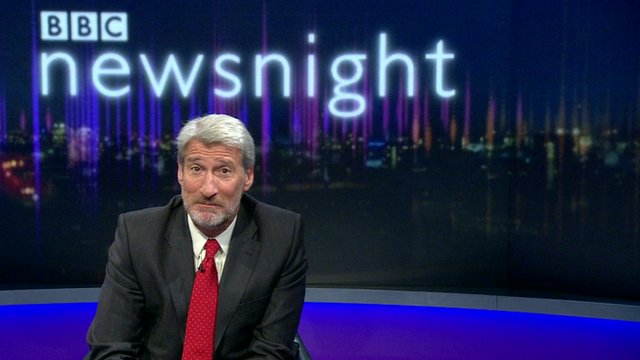
Poets, we all agree, are terribly misunderstood and undervalued. If it were not for poets, how would we know what things were like other things. How would we live! How would we love! How would we die! They are a priestly class, helping us to mark out our minutes with prayers in pentameter.
But as with any priestly class, they deal in mystery. And demands to decode that mystery are heretical.
This is certainly the impression one would get judging from the reaction to Jeremy Paxman’s comments on poetry and public engagement this week.
Launching the shortlist for the Forward Prizes for poetry, the judging panel of which he chaired, Paxman, with a nod and a wink so heavy that he would have been in serious trouble if the wind changed, suggested that contemporary poetry had “connived in its own irrelevance” by failing to engage with the everyday lives of “ordinary people”. “It’s the general public that poets have to start engaging with,” said Paxman. “And that, I’m, sure, is why the people at Forward said ‘will you join the judging panel’”.
Translation: “The people at Forward knew that me saying something even slightly controversial about poetry would get their prize column inches, and I’m happy to oblige.”
Paxman went on to suggest, whimsically, a public inquisition where poets would explain their work to members of the public, rather than just to other poets.
Frankly, good on Paxman for recognising his use to the Forward Prize. That is not to say he is an man with little to say about poetry; indeed, he’s contributed greatly to the cause of poetry by wheeling out his “Jeremy Paxman” act free of charge for it. He was also, of course, in very careful to praise contemporary poetry and the marvellous books he’d read as a judge.
But that praise was as naught to some poets, who instead chose to pick up on his idea of a people’s panel to judge poetry, and his naughty use of the word “inquisition”.
For people who deal mostly in metaphor, the poets who rose to the bait took the Newsnight presenter’s words remarkably literally.
Todd Swift, a poetry publisher who runs the Eyewear Imprint, wrote that an inquisition was “a strange thing to ask for in an anti-clerical democracy – the idea of burning unrepentant poets at the stake after torturing them is only barely witty in a world where in many many nations, poets really are tortured and silenced.”
Oh Todd. He didn’t mean an actual inquisition.
Swift goes on to say, with an apparent lack of irony that would have horrified the more famous poet of his name: “Only in middle-class (upper class?) London could a white man think interrogating and potentially killing poets was a clever and useful corrective trope. It smacks of easy intellectual arrogance. I find many journalists despise, or fear, or dislike poetry, mainly because poetry is the best-written and most compressed form of language, and is smarter than journalism.”
You tell those journos and their easy intellectual arrogance, Todd!
Swift finishes off by saying “it becomes clear [Paxman] didn’t really read any of the 175 books he was meant to judge”, a statement that is almost certainly defamatory, as any journalist would have told him if he’d asked.
George Szirtes, a poet well respected by his peers, went down a slightly different route. Szirtes, a refugee from the Soviet tanks that rolled over his native Hungary in 1956, compared Paxman’s suggestion to Stalin’s demands for socialist realism from the USSR’s artists.
Szirtes makes some good points writing for the Guardian, but unfortunately they all follow from a sly trick he plays writing that Paxman’s fanciful inquisition would be a place where “poets would be required to explain themselves and, presumably, answer for their failure to be simpler.”
That “presumably” appears to give Szirtes a license to put words in Paxman’s mouth. Suggesting people explain their work is not at all the same as demanding it be simpler, merely that they be capable of (and interested in) talking about their work to non poets.
As another poet, Katy Evans-Bush, put it, writing about the furious condemnations of Paxman on Facebook (Facebook is where poets go to fight; no one is quite sure why). “Heaven forfend that someone from the wider world should look into your ‘cave of making’, see your ‘pellety nest’, and remark on it. ”
This all matters because poetry matters. Poetry is where we learn to play with words, to deal in metaphor, wordplay, the non-literal, the non-prosaic. How often have you heard someone say they’re “not into” or “don’t get” poetry. It’s frustrating, but poets should see that as a challenge, rather than turning in on themselves. That’s not a call to dumb down; it’s a call to act up. When you’re egged on to do so, it’s simply not enough to cry “Stalin!” and retreat further. That’s exactly the hyperbole and self regard that puts people off. If you care about an art form, you should want people to know about it. Otherwise it is youv-vnot Jeremy Paxman or the Forward prize or anyone else – who is censoring poetry.
This article was published on June 5, 2014 at indexoncensorship.org
05 Jun 14 | Azerbaijan News, Events, News and features
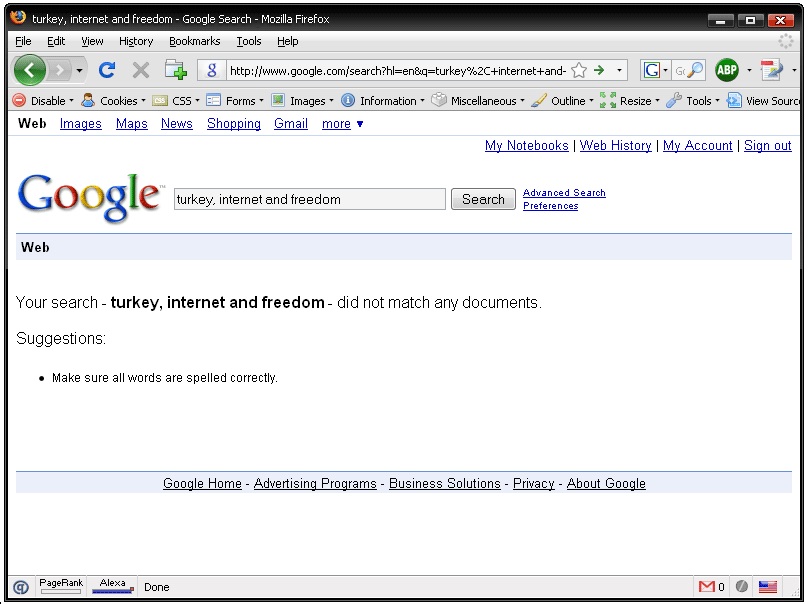
(Photo: Kusadasi-Guy via Creative Commons)
“Whenever we’ll have to choose between excessive regulation and protection of online freedom, we’ll definitely opt for freedom” Vladimir Putin, 1999
Since Putin said this, 3 days before becoming President, history has marched on…
“We will make arrangements without limiting and restricting freedom, but also without bowing to threats and without ignoring the dangers. We will hand over Turkey to generations who are not slaves to technology, but who rule and direct technology” Recep Tayyip Erdoğan, 2014
Terrorised twitter users, blackmailed bloggers and intimidated independent media, digital freedom has been facing a crack-down in Russia, Turkey and Azerbaijan.
Index on Censorship are bringing some of these countries foremost journalists and digital freedom advocates to Brussels to discuss events in their countries, to debate what the EU could do to help and to consider what we ourselves could learn from these experiences?
As we approach several major summits on internet governance, how can the EU tackle the growing risk of fragmentation, avoid calls for forced local hosting and stand up to the top-down approach favoured by the Russians?
“Is it because I was free that I was warned that I was going to lose my column if I would not stop criticizing the government? Is it because I was free that I was fired when I turned a deaf ear to warnings?” Amberin Zaman
The discussion, moderated by new Index CEO Jodie Ginsberg, will include:
- Andrei Soldatov – Investigative Journalist, Founder Agentura.ru. @AndreiSoldatov
- Anton Nossik – Blogger and Founding Editor-In-Chief of leading news websites inc. Gazeta.Ru, Lenta.Ru, Vesti.Ru, NTV.Ru (now NewsRu.com). @dolboed
- Dr Yaman Akdeniz – renowned advocate and Professor of Law, Istanbul Bilgi University, Founder and Director of Cyber-Rights.Org. @cyberrights
- Amberin Zaman – Censored former columnist at Haberturk, current journalist at Taraf and Turkey correspondent for The Economist.
- Arzu Geybulla – Azerbaijani Blogger, based in Istanbul. @arzugeybulla
WHEN: 5pm CET, Thursday 19 June 2014
WHERE: Google, Chaussée d’Etterbeek 180, Bruxelles, Belgium
TICKETS: Free but space limited – RSVP to [email protected]
Follow the discussion live @IndexEvents – #beatingretreat
05 Jun 14 | Events

Join Index on Censorship Magazine at Leeds Big Bookend Festival to debate whether it is acceptable for governments and others to withhold information from the public during a conflict or war.
Is it always unreasonable not to tell the public the whole truth? Is propaganda sometimes necessary? Maybe the USA wouldn’t have entered WWII without it, so can it be justified? Does propaganda or censorship matter? Why and when should we care?
With Major Ric Cole (Former Royal Marines Commando & Infantry Officer), Dr Chris Paterson (author ‘War Reporters Under Threat: The United States and Media Freedom’), Chris Bond (Yorkshire Post & Legacies of War) and Rachael Jolley (Editor, Index on Censorship Magazine).
When: Saturday 7th June, 12:30 – 13:45pm
Where: Leeds Central Library, LS1 3AB
Tickets: Book your tickets here.
04 Jun 14 | Brazil, News and features, Religion and Culture
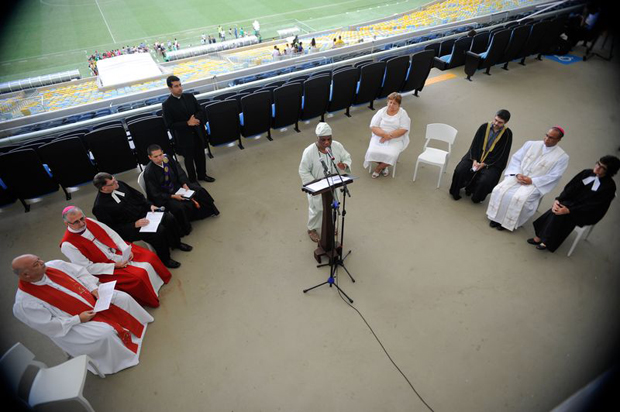
An inter-religious meeting at the Maracanã stadium in Rio de Janeiro to mark the beginning of the Peace Cup campaign (Tomaz Silva/Brazil Agency)
A request to remove 16 videos from YouTube has sparked a broad debate on the limits of freedom of speech and religious expression in Brazil. According to the complaint by the National Association of African Media, filed to the Regional Prosecutor’s Office of Rio de Janeiro (MPF), the videos encourage intolerance and prejudice against religious practices of African origin (Candomblé and Umbanda). The videos were posted by the Igreja Universal do Reino de Deus (IURD), a Neo-Pentecostal church.
The federal prosecutors from the MPF asked Google Brazil to remove the videos. But Google refused, arguing that the material disclosed “would be nothing more than the manifestation of the religious freedom of the Brazilian people” and that the videos “did not violate the company’s policy”.
On 17 May, the issue was taken to the federal court in Rio de Janeiro. There, judge Eugenio Rosa de Araújo denied the request for the removal of the videos. “Its contents are manifestations of free expression of opinion,” he stated. He argued that “the African-Brazilian religious practices do not constitute a religion” because “the religious manifestations (African) do not contain necessary traits of a religion”. He stated that a religion needs to have traits such as a baseline text (“as the Bible or the Koran”), a hierarchical structure and one God to be worshiped.
Notably, the ruling has two parts: the first determines that the videos are to be kept online, and is based on the right to freedom of expression. In the second part of the sentence, the judge defines what religion is, and excludes religions with African-Brazilian origin from this scope.
The representative of the Commission Against Religious Intolerance, Ivanir dos Santos, accused the judge of encouraging prejudice. “He is an employee of a laic State and is submitted to the Brazilian constitution and laws. He violated the constitution and the law against the racial discrimination.”
Facing such strong reaction, the judge Eugenio de Araujo Rosa went back on his decision. In a statement, he admitted he made a mistake and revised his sentence. “The strong support of the media and civil society demonstrates unquestionably the belief in the worship of such religions,” he said, referring to African-Brazilian beliefs.
But the original position of the judge is still causing reactions. The Order of Lawyers of Brazil repudiated the ruling, while the MPF has filed an appeal, arguing that “the decision mistreats the awareness, the honour and the dignity of millions of Brazilians who recognise themselves in these religions”. Protests by African-Brazilian culture organisations were held in at least seven cities. Leaders of all Brazilian beliefs gathered at Maracanã Stadium, calling for more peace and religious tolerance.
In addition, representatives from the MPF will file a lawsuit to the Superior Court of Justice (STJ), one of the highest organisations in the Brazilian judiciary system, against Judge Eugênio Rosa de Araújo. “Our intention is to remove the videos. It is not about freedom of expression, but about the spread of hatred,” said Santos.
On 28 May, the Federal Regional Court (TRF) received a petition with 1,000 signatures, demanding the removal of the videos. The petition was organised by the Commission Against Religious Intolerance and the National Association of African Media. The representatives of the afro culture argue the court’s decision to keep the videos on the internet violates the Universal Declaration of Human Rights, Article 129 of the Brazilian Constitution, and the Statute of Racial Equality (Law 12.288/2010). The statute stipulates that the government must protect the communities of African origin from hateful content in the media. The law forbids “the use of the media to disseminate images and contents that expose a person or group to hatred or contempt on the grounds of religion with African roots”.
FuA national demonstration against prejudice towards African-Brazilian religions has been scheduled. The event is organised by various associations for the defence of black culture, with the support of the Order of Lawyers of Brazil, the National Council of Justice (CNJ), the Human Rights Commission of Congress national and the Organization of American States (OAS). In congress, the Parliamentary Front in Defence of “Traditional Peoples of Terreiro” was created, aiming to institutionalise the defence of religions of African origin. The bloc will be a counterpoint to the Evangelical Parliamentary Front, which brings together 77 congressmen who form the base of support for the government of Dilma Rousseff.
“The theme is of utmost importance, because [it] involves guarantees which the constitution itself assures. I hope that it resolves itself quickly,” the President of the Federal Court, Sérgio Schwaitzer, told the Jornal do Brasil.
According Edson Santos, the deputy of PT (Workers Party) and former minister of racial equality, the judge encouraged the prejudice against African-Brazilian sects. He argued that the magistrate will be denounced at the National Council of Justice. “The decision was absurd and deeply regrettable, because it hurts the constitution”, he told to the newspaper Folha de S. Paulo.
“This conflict of law is challenging and raises questions about the limits of freedom of expression,” said Professor of Philosophy of Law José Rodrigo Rodriguez, of Law School of São Paulo from the Fundação Getúlio Vargas. Analysing the topic in an article, he argues that “one can say, without fear of any excess, that the decision has a clear discriminatory effect, despite the certainly good intention of the judge”.
This article was posted on June 4, 2014 at indexoncensorship.org














